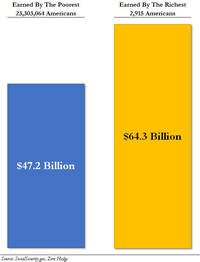![World Economic Forum and Income Inequality]()
The World Economic Forum has identified income equality as the most likely threat to the global economy.
Here are some notes on the issue, and *I would welcome interviews on the subject.*
Income inequality is a terribly complex issue, and for generations, economists have grappled with its causes and consequences, which feed on each other.
In modern times, inequality has been caused, primarily, by two factors: globalization, the technologies that drive it, and well-meaning government policies that address symptoms rather than the structural problems that cause and exacerbate inequality.
Globalization has enabled the very best people--opera singers, baseball players, and even economists and journalists--to reach much wider audiences and earn incomes many times greater than their peers.
Before the radio, phonograph, and moving pictures, virtually every city, small and large, had a musical hall, opera house, or some structure that served that purpose on Friday and Saturday nights. Each city had local musicians and opera singers who enjoyed local renown and who earned a living performing. The top stars sang in New York, London, etc., and earned more money, but local performers and traveling journeymen earned a decent living.
The radio and phonograph created the first international media stars--e.g., Caruso. His voice was heard around the world, and broadcasts and inexpensive recordings reduced the demand for local concerts and gradually closed most local opera houses. His income soared to levels unheard in past generations, but local opera stars were left without work.
The same phenomenon occurred in popular music and dramatic acting (the movies and the decline of Vaudeville); baseball (regional broadcasts of major league teams vs. minor league teams that populated virtually every small town); among economists (jet travel, Skype, and the internet that afford wider consulting and speaking opportunities); and among journalists (satellite, cable, and internet to reach millions across the country and globe in language affinity populations and raise opportunities for national reporters/columnists vs. local newspaper reporters/columnists). Much the same goes for Wall Street Bankers, big-time lawyers, oil company executives, etc.
At the level of ordinary workers, cheaper air/ocean/rail transportation for goods and the internet for services have magnified and increased the scope of labor market arbitrage--fancy words for workers in the United States now competing with those in China, but also northern Europe vs. southern Europe and big Chinese cities vs. other points in Asia and rural China.
Governments have handled this badly, making the extremes of income worse. Big cities in the United States, often with implicit federal support, subsidize concert halls, opera houses, and our modern cathedrals (stadiums and arenas) that subsidize big league singers and ball players--this has accelerated the demise of local performers and athletes.
The United States and EU have gone along with trade and environmental agreements that permit China to continue high tariffs, currency manipulation, and carbon-loading that make "made-in-China" even cheaper. That creates the U.S. trade deficit and unemployment, and pushes down wages for ordinary American workers. It also wreaks havoc on the environment, creating other pressures disproportionately on the poor.
In Europe, the government imposed a single currency that is overvalued for southern Italy, France, Portugal, Spain, and Greece, while undervalued for Germany and other northern economies. The latter have trade surpluses and prosperity, the former have unemployment and sinking incomes.
In China, the one-child policies and limits on movements of families (especially children) to big cities suppress rural incomes and elevate rural poverty. One in every five Chinese children lives without their parents: migration regulations permit the parents to go to cities for work but they can't bring their children to cities where they find factory and service jobs. These children drop out of school, become unemployed, and will create enormous social problems in the next generation.
Across the world, disparities between the better and worse off are making education more unattainable for the children of poor and working class. This is setting off a self feeding dynamic, and a social time bomb, but government policies that seek to ameliorate this problem often make things worse.
Loans for education drive up prices in higher education, and the best professional schools. In the United States, for example, community and second-tier, four-year colleges have lots of minorities and children from low- and middle-income families, but many don't find jobs that pay much better than high school graduates. They are saddled with huge debt to pay for an education that did not add a lot of value.
Enrollment at top professional schools is dominated by children whose parents are well off. Those get the jobs working on Wall Street, in Big Law, in big corporations, or in some kind of other well paying firm. Even with loans, mostly only the well-off can afford or get into Columbia Law.
ObamaCare is making health insurance very expensive for working- and lower middle-class families and driving up the cost of health care that makes income disparities worse not better.
Putting otherwise employable people on public assistance encourages the same in children. This has been verified by nonpartisan research-National Bureau of Economic Research .
Extended unemployment benefits actually increase unemployment. Again verified by the NBER .
For the United States, I have written about inequality and unemployment insurance in newspapers across the country. Here is a sample:
· www.baltimoresun.com/news/opinion/oped/bs-ed-fixing-inequality-20140114,0,1774207.story
· http://www.thestreet.com/story/12240905/1/fixing-inequality-america-must-play-its-strengths.html
· http://www.ajc.com/news/news/opinion/obamas-policies-make-inequalities-a-lot-worse/nZybf/
· http://www.thestreet.com/story/12240905/1/fixing-inequality-america-must-play-its-strengths.html
· http://www.desmoinesregister.com/article/20140109/OPINION01/301090040/Another-view-Unemployment-benefits-a-hoax-on-working-poor?Opinion&nclick_check=1
· http://www.thestreet.com/story/12210682/1/morici-unemployment-benefits-a-burden-on-the-poor.html
Reported by Breitbart 1 hour ago.
 The World Economic Forum has identified income equality as the most likely threat to the global economy.
The World Economic Forum has identified income equality as the most likely threat to the global economy. Peggy Noonan writes in the Wall Street Journal that the disease endemic to Washington ravaging the country is selfishness. With slightly hyperbolic rhetorical flair, she calls politicians “the locus of selfishness in the modern world.”
Peggy Noonan writes in the Wall Street Journal that the disease endemic to Washington ravaging the country is selfishness. With slightly hyperbolic rhetorical flair, she calls politicians “the locus of selfishness in the modern world.” As we noted previously,
As we noted previously,







